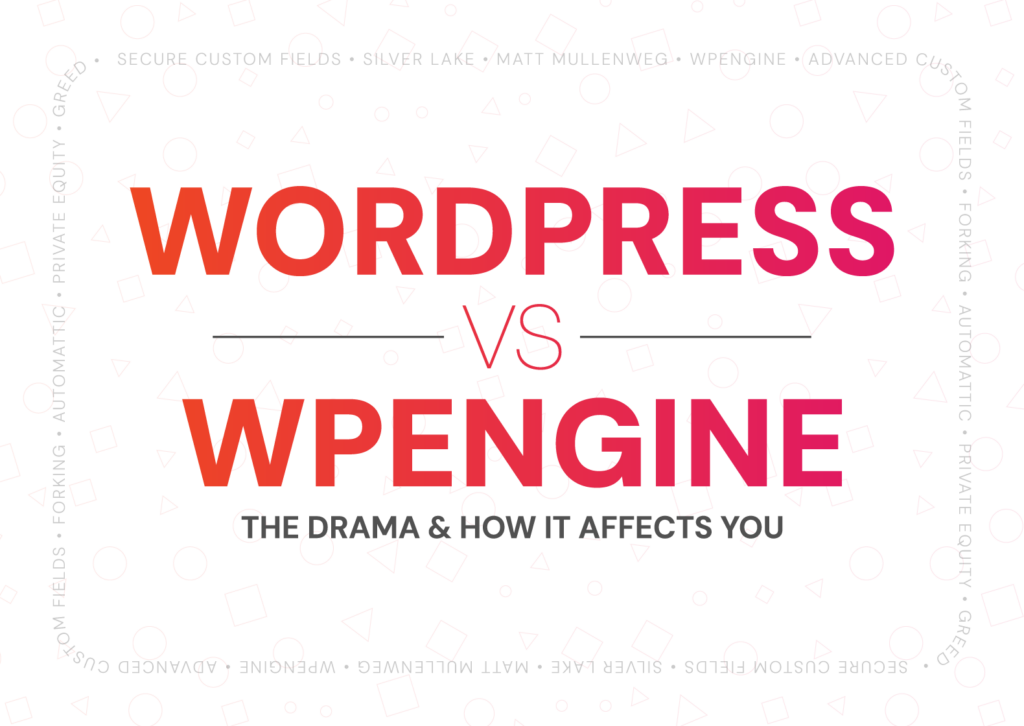Please note: The following blog is a breakdown of events that are relevant to Fyresite and our clients. However, it does not reflect any Fyresite opinions.
If you’re involved in technology, you’re probably aware that there has been massive tension between WordPress and WP Engine. But you might still be wondering what exactly is happening and how it impacts them. Fyresite, your trusted expert in WordPress, is here to help.
Key Players in the WordPress vs. WP Engine Legal Battle
There are a few key players to know in order to understand the crux of the WordPress and WP Engine drama.
WordPress
WordPress is an open source technology for building and running websites. They are responsible for 40% of sites. Founded in 2003, they have grown from blogs to marketing websites. They also offer WooCommerce, an eCommerce platform.
Matt Mullenweg
Matt Mullenwag is one of the founders of WordPress. He is also the current CEO of Automattic. In other words, Mullenwag is the face of WordPress, and is the force behind these decisions.
WP Engine
WP Engine is a popular hosting solution for WordPress websites. In 2018, private equity firm Silver Lake bought a majority stake in the company.
Advanced Custom Fields (ACF)
Advanced Custom Fields, known most commonly as ACF, is a popular plug-in for WordPress that allows users to add extra content fields to WordPress edit screens. Some developers credit ACF with helping WordPress make the big jump from a blog server to a proper CMS.
ACF is used by 99% of Fyresite’s WordPress clients, and is crucial to brands across the web. In 2022, WP Engine acquired plug-ins from Delicious Brains, including ACF.
The Background
There has been escalating tensions and legal battles between WordPress and WP Engine.
What started as a blog post from Matt Mullenwag has escalated into cease-and-desist letters being sent from both sides, the forking of a plug-in, and outrage from both the companies involved and hundreds of developers and website owners.
On September 21, 2024 a blog post was published from WordPress founder Matt Mullenwag entitled “WP Engine is Not WordPress.” In this post Mullenwag spoke about how WP Engine uses branding, marketing, and advertising that purposely misleads users into believing that they are affiliated with WordPress, and they need a trademark license to do so. He also said that they dedicate very little time to WordPress’ open source community, only doing 40 hours a week. He called WP Engine a ‘cancer’ which disables important security features in favor of profit and suggested users find a new host.
In response to this post, WP Engine sent a cease-and-desist letter, which asked WordPress to withdraw their comments. They also claimed that they did not need a trademark license, as their use of the WordPress trademark is covered under fair use laws.
They went on to say that Mullenwag was threatening a ‘scorched earth’ approach if they did not pay what they called a significant portion of their revenue to WordPress for a trademark.
WordPress/Automattic responded to this with a cease-and-desist letter, saying that WP Engine was in violation of WordPress and WooCommerce trademark usage laws. They claimed that even though ‘WP’ was not covered in the WordPress trademarks, it was being used purposefully in a way to confuse people.
Escalations
The first escalation came on September 25th. WordPress banned WP Engine from being able to access their resources. What did this do? It broke a lot of sites. Users who hosted their WordPress sites through WP Engine were unable to update essential plug-ins and themes. This left sites, especially small sites, unprotected.
In another blog post on September 27th entitled “WP Engine Reprieve”, Mullenwag said that he would lift the ban until October 1st, the deadline for WP Engine to reach a trademark licensing deal with WordPress.
During this temporary lift on the ban, WP Engine addressed the trademark issues that Automattic had addressed in a letter and found solutions for pushing their own updates, without relying on WordPress.
The ban was reinstated, and remains in place as of the time of this publication. Since then, WordPress has released a statement about ‘forking’ popular plug-in ACF.
The Issues
On WordPress’ side, they believe that WP Engine has been in violation of trademark law and owes WordPress money for the use of their trademark, as well as a licensing fee for the future use of the trademark. According to Mullenwag, WordPress has been trying to reach a trade marketing license deal with WP Engine for a long time, and they have been stringing them along.
On WP Engine’s side, they claim that their usage of the WordPress trademark was legal under free use. They also updated their website to change the specific complaints that were outlined from Automattic, and updated the footer to reflect that they have no direct affiliation with WordPress.
Despite these actions, WordPress still is in legal battles with WP Engine over their usage.
WP Engine filed a suit in California on October 3rd, suing Automattic and Mullenwag for abuse of power.
Perhaps the biggest issue that has come out of the debacle is not directly related to any legal action at all. The biggest issue that people are having? What has happened to ACF.
The ACF of it All
As we mentioned above, ACF is one of, if not the, most popular WordPress plug-in. As they are owned by WP Engine, they were also not able to access WordPress resources once the ban was put in place. For users on the ACF Pro plan, this was no big deal. Users on the free plan weren’t so lucky. The free plan was hosted through WordPress, meaning that the ban stopped them from being able to update.
This access issue meant that ACF could not access the repository to update their free plan, causing a huge wave of concern about the security of it. The only way that they could get their free users the upgrade is by sharing the instructions to update it manually. However, these instructions are confusing for some users, and add more work to already busy workloads.
On top of this, WordPress announced on October 12th that they were ‘forking’ ACF. What does that mean?
It means that ACF has been turned into a new WordPress plug-in called Secure Custom Fields (SCF). SCF is owned by WordPress, but has taken over the ACF url slug, reviews, and development history.
Users who completed the update or on the Pro Plan aren’t impacted. Users who are on the free version of ACF and have not done the manual update are suddenly finding themselves being automatically switched to SCF.
The Reactions
As you can imagine, when business drama impacts users, those users become vocal.
In general, there was a sense of discomfort and concern about keeping sites secure and if they needed to migrate their sites to keep them functioning.
Large discussion posts popped up online, primarily sites like Reddit, where users and developers could talk about what they thought. Some felt WordPress had overstepped, while others felt that WP Engine needed to contribute more to the open source community.
At Automattic, there was also much discourse. Severance packages were offered to employees who objected to the new direction. A little over 8% of their employees took this package, costing millions of dollars. 80% of those who left worked in the WordPress division.
In general, most people have been incredibly critical of the forking of ACF. In reviews of what is now SCF, users are slamming WordPress for what they’re calling a hostile takeover and an ethical breach.
Need Help Navigating Your WordPress Site?
We can help. Fill out our form below.
"*" indicates required fields
 Taylor Simmons
Taylor Simmons 

